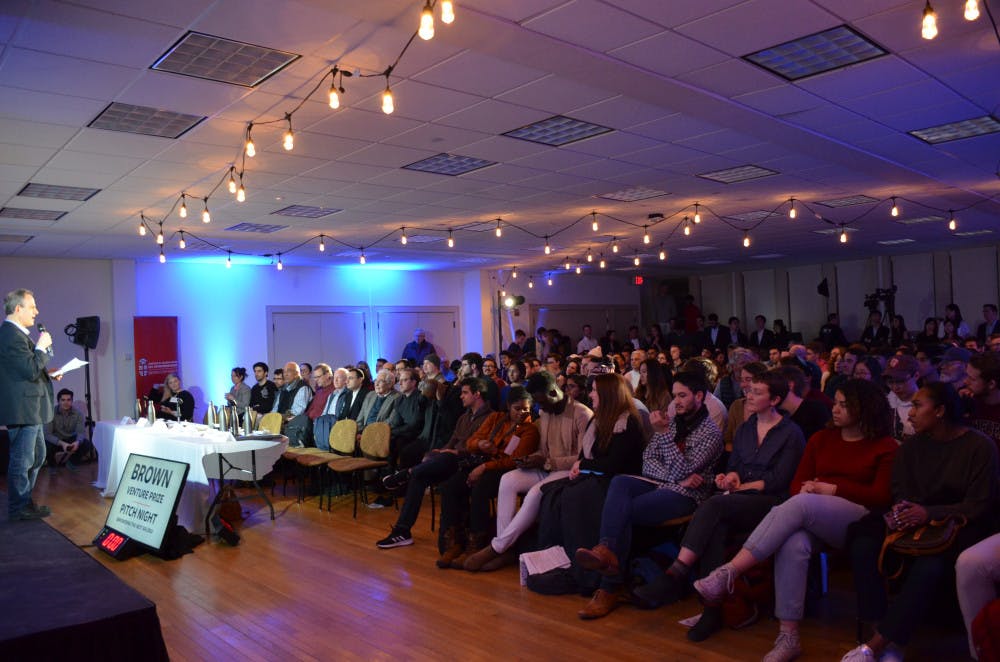With a $25,000 prize on the line and a sold-out crowd of over 250 people, eight teams of young entrepreneurs took the stage last Wednesday for the second Brown Venture Prize Pitch Night, presenting their startup ideas and vying for the favor of seven alumni judges.
The student startup Formally nabbed the grand prize, while the second and third prizes of $15,000 and $10,000 went to startups goTeff and Embonet, respectively.
The eight finalists were selected from a pool of 27 applicants with both undergraduate and graduate members. Winners not only received funding, but also a trip to New York City in April, where they will be meeting with alums and investors, said Danny Warshay ’87, executive director of the Nelson Center for Entrepreneurship.
The Venture Prize, supported by the Nelson Center for Entrepreneurship and funded by Neil Parikh ’11 and Luke Sherwin ’12, is part of the Nelson Center’s effort to empower students to practice entrepreneurship, Warshay said.
“We don’t consider ourselves a business factory, we are a center that empowers people to identify problems and develop solutions with impact,” Warshay said. The teams that entered and were selected for that final pitch prize night “are a good reflection of that emphasis,” he added.
Led by Benjamin Murphy ’19, Diane Mutako ’20, Amelie Vavrovsky ’18 and Noah Picard ’18 GS, Formally is a software intended to simplify immigration forms for asylum seekers coming to the United States. Planned to launch April 1, it breaks down complicated immigration forms into “plain language” and provides translations while guiding applicants through one question at a time, Vavrovsky said. After growing up in the increasingly Islamophobic and xenophobic country of Austria and working with refugees, Vavrovsky said she felt compelled to help develop the software for an immigration process that she calls “incredibly inhumane” and a “glaring problem.” In the United States, Vavrovsky said she noticed that asylum forms are almost impossible to complete without an attorney, but often asylum seekers are not provided with one.
goTeff, the second place winner founded by Abenezer Simon Mechale and Saron Simon Mechale ’19, is a “mission-driven nutrition brand” that sells teff grain, a superfood from Ethiopia, and teff grain snacks. The student startup aims to provide improved nutrition to consumers in the United States while empowering Ethiopian farmers, according to the Nelson Center’s website.
The third place prize went to EmboNET, an “embolic detection device,” which is a mesh device put into the body during heart bypass surgery that captures debris in the blood before it can travel up to the brain. Developed by Berke Buyukkucak ’18 GS, RISD graduate Emily Holtzman, Gian Christian Ignacio ’18 MD ’22, Celina Hsieh ’18 MD ’22 and Ileana Pirozzi, the device consists of double-layered pocketed mesh, created by Holtzman, a RISD textile student. Theoretically, this device will reduce the risk of stroke and cerebral injury associated with cardiac bypass surgeries. With a team composed of two biomedical engineers, two medical students and one RISD student, EmboNET is “such a good example of the high priority we place on diversity of background, of training and of skill,” Warshay said. One of the goals of the Nelson Center is to “nurture an environment of accidental collisions,” he added.
Though the Venture Prize goes to Brown students, those involved with the event hope it will support the larger innovation economy in Rhode Island. “We believe in entrepreneurship as a way to improve Rhode Island,” said Thorne Sparkman, the managing director of Slater Technology Fund. The Slater Technology Fund collaborates closely with the Nelson Center and provides seed money for startups in Rhode Island.
And while many entrepreneurs will leave the state, “Rhode Island is a place that you can wrap your arms around very easily,” Warshay added. “If you’re a Brown grad, it’s an environment you can get to know in your four years here,” and there’s an “easy continuity between your time as a student and a Rhode Island resident.”
Michelle Petersen ’18, founder of the startup TextUp, a software for social services and nonprofits, came in third place at last year’s Brown Venture Pitch Prize Night. Since graduating, she has found Providence to be productive for startups, citing the Brown alumni network. “We were able to get expertise from a lot of Brown (alums) and Brown-affiliated folk, and almost all of it was entirely for free,” she said.
Last year, “no one really knew what to expect,” but this year tickets were sold out, and “people were watching the live stream all over the world,” Warshay said. While only the second iteration of the Prize Night, the Brown Venture Prize and Nelson Center only plan to grow.





